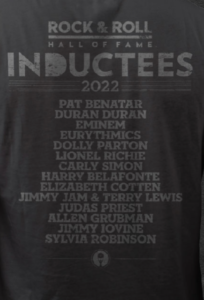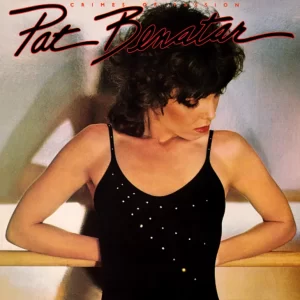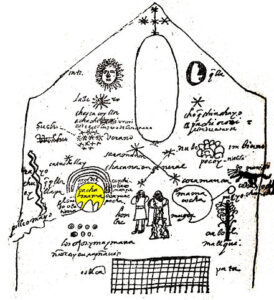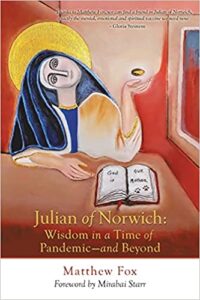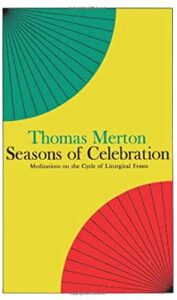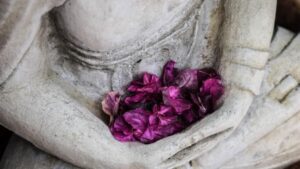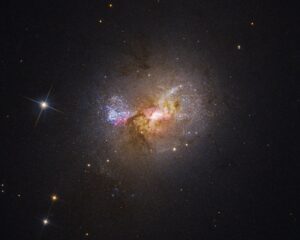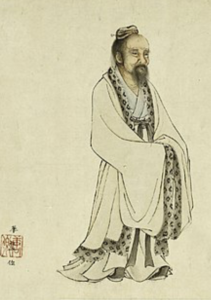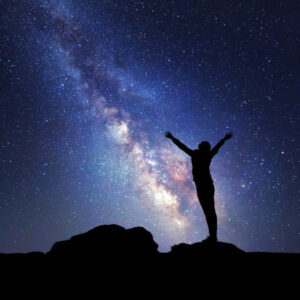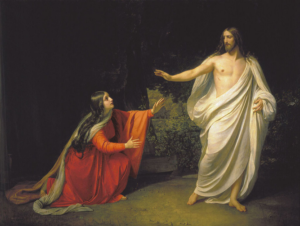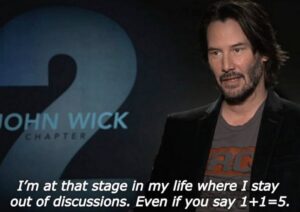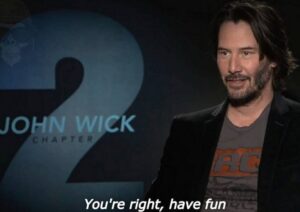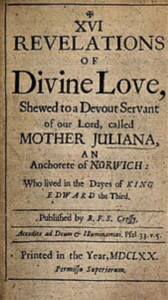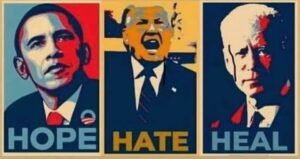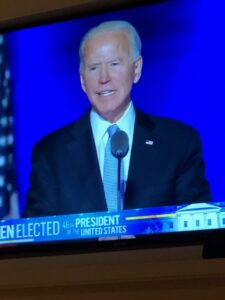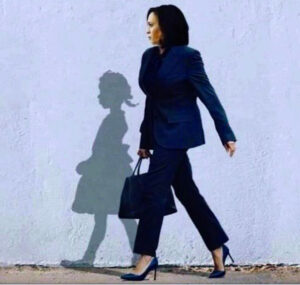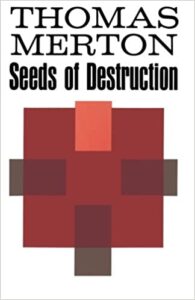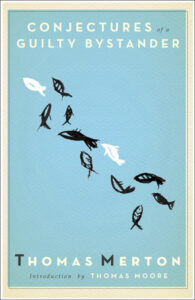Thomas Merton
Saturday morning.
May 7, 2022Respite from the tilt toward darkness our planet collectively shares.
Peace.
Compassion.
Love.
Our spiritual compass.
‘It is only with the heart that one can see rightly; what is essential is invisible to the eye.’ -Antoine de Saint-Exupéry.
[My thesis.-dayle ❀]
From poet Pádraig Ó Tuama:
“Friends, there are many things that crowd your attention. And many things deserve your attention. May you find the space to pay attention to what is important, to feel the feel of feelings, and to find ways to respond with action, care, justice, kindness, time, and whatever else is needed. Beir bua.” [Bring Victory]
Sharing a beautiful curation from journalist and author Dan Rather and his writing partner Elliot Kirschner. They title their compilation, ‘Smile for Saturday’ featured on their ‘Steady’ published on the Substack platform. Subscriptions are open. -dayle
Blackbird
Music has a way of speaking to us, across genres, across performers, and across the years. It is a conversation that builds from what was said before and evolves over time. All these thoughts flooded forth when we discovered a video of the brilliant musician Jon Batiste performing his version of the Beatles song “Blackbird.”
The occasion for the 2016 performance was the 52nd anniversary of the Beatles’ television debut on “The Ed Sullivan Show,” and Batiste was appearing on the very same stage as they had. As many of you likely know, the Ed Sullivan Theater is now home to “The Late Show with Stephen Colbert,” where Batiste serves as musical director.
Batiste plays “Blackbird” on the piano, whereas the song’s co-writer Paul McCartney (John Lennon shared the writing credit) played his version on the guitar. The musical style also differs, and so does the delivery of the lyrics. But there is a kinship of evocative musicality linking this version to McCartney’s that brought a big smile to our faces. Batiste’s Juilliard-honed abilities as performer and arranger are on full display. So, too, is the genius of the original.
At a time when we are fractured, this song made us feel whole. At a time when we are unmoored, this feels rooted. At a time when we see far too many acts of hate, this feels like a tribute of love.
Left in awe of this performance, we decided to dig a little more into the history of “Blackbird.” And things got even more interesting. It turns out the lineage of the song goes back well before the 1968 White Album on which it first appeared — as in centuries back. “Blackbird” was inspired by Johann Sebastian Bach — more specifically, his famous “Bourrée in E minor.” We will let Sir Paul himself tell you the story.
Bach’s piece was originally written for the lute but has since become a staple for classical guitar. If you are still with us and want to continue this musical journey, here is a performance of the piece on its original instrument.
Through our research we became a bit obsessed with Batiste, his story, and his music. We encourage you to listen to more from this remarkable talent.
‘Innocent bystander.’ Thomas Merton: I am no longer smiling … for I do not think the question of our innocence can be a matter for jesting, and I am no longer certain that it is honorable to stand by as the helpless witness to a cataclysm, with no other hope than to die innocently and by accident, as a nonparticipant. ♀︎
Beautiful prompt.
March 17, 2022How should we celebrate your day?
If today was a holiday in your honor, what would it be about?
If we had to examine everything about you, your work, your impact, your reputation–what would be the positive caricature we would draw? What sorts of slogans, banners and greetings would we use to celebrate you and your work?
It’s never accurate to boil down an organization or a person’s work to a simple sentence or two, but we do it anyway.
What’s yours?
-Seth Godin
We can create this honor in any moment, and shift our lives to live that honor. What will your day be about? -dayle
“Make your life a little less difficult to another.”
A. Stoddard:
“Don’t quite before the finish line. Walking away from something that is bad for you is not quitting.”
Horace, ‘Never despair.’ Winston Churchill, ‘Never, never.’
Thomas Merton:
“The history of the world, with the material destruction of cities and nations and people, expressed the interior division that tyrannizes the souls of all men, and even of the saints.” -New Seeds of Contemplation
From Merton’s The Sigh of Jonas
“Sooner or later the world must burn, and all things in it…for by that time the last man in the universe will have discovered the bomb capable of destroying the universe, and will have been unable to resist the temptation to throw the thing and get it over with.
And here I sit writing a diary.
But l o v e laughs at the end of the world, because love is the door to eternity; and, before anything can happen, love will have drawn him over the sill and closed the door, and he won’t bother about the world burning because ehe will know nothing about love.”

“Today will be different. Today I will be present. Today, anyone I speak to, I will look them in the eye and listen deeply. […] Today I will take pride in my appearance. I’ll shower, get dressed i proper clothes, and change into yoga clothes only for yoga, which today I will actually attend. […] Today there will be an ease about me. My face will be relaxed, its resting place a smile. Today I will radiate calm. Kindest and self-control will abound. Today I will buy local. Today I will be my best self, the person I’m capable of being. Today will be different.”
“Mother Earth and culture, the mother of mothers, are both a state, even as reverence toward Pachamama is on the rise.”
[Pachamama is a goddess revered by the indigenous peoples of the Andes.]
“Let us apply Julian’s teachings on motherhood to Mother Earth. As we saw in chapter 4, Hildegard was explicitly in her language about Mother Earth, demanding that ‘the earth must not be destroyed.’ The destruction of the earth is the destruction of the feminine. Matricide is ecocide, and ecocide is matricide. Invasion of indigenous lands and destruction of their cultures, the spreading of viruses that killed millions of indigenous peoples…the outcomes were the same. History is filled with matricides of all kinds Genocides, too” (p. 95).
[…]
“The ancient Hindu sages, we are told, ‘predicts the age in which we are now living.’ For them Kali Yuga represents the collapse of every kind of inner and outer coherence and personal and institutional forms of compassion, concern, and justice” (p. 95).
Matthew Fox, ‘Julian of Norwich: Wisdom in a Time of Pandemic-and Beyond.’
Thursday, February 17th, 2022
February 17, 2022‘Our minds our like crows. They pick up everything that glitters, no matter how uncomfortable our nests get with all the metal in them.’
-Thomas Merton, 1961, Seeds of Destruction
Apropos for contemporaneous news cycles and destruction of social media. -dayle
For the thousands who die everyday from the pandemic still, whose deaths are only felt in numbers, not souls…1,000,000 total as of today. -dayle
‘Any disaster you can survive is an improvement in your character, your stature, and your life.’
-Joseph Campbell
‘What is to give light must endure burning.’
-Victor Frankl
A prayer from Marianne:
‘I place my relationship with him in your hands. May my presence once again be a blessing in his life, and my his be blessing in mine. May my thoughts toward him be those of innocence and love, and may his toward me be the same. Amen.’
❀
Dirty Laundry
February 9, 2022“It’s all about big dirty money.”
-Adam McKay
(Producer, screenwriter, ‘Don’t Look Up!’)
Corporate owned media. Pretty much all of it. -dayle
The Daily Poster
Corporate Media Is The Misinformation Problem
BY DAVID SIROTA
“Misinformation” is all the rage these days — it’s the topic du jour. Pollssuggest we all agree that it’s a problem, and lately liberals appear most mad at it — but seemingly only at certain kinds of misinformation that originate outside the corporate media sphere.
Notably, the ire is rarely directed at a corporate media machine that systematically rewards and praises the purveyors of misleading propaganda, and continues to flood the country with information sewage.
This selective outrage is a huge problem — because the only way to systematically combat misinformation is to construct a Fourth Estate that develops some trust with the audience. That trust will never be rebuilt if liberals pretend to hate misinformation while they patronize a media establishment that fortifies the pathologies that originally created a credibility crisis.
Consider the past week of media news, while the Joe Rogan controversy dominated headlines:
NBC News hired Stephen Hayes, one of the key architects of Iraq War misinformation, to serve as a political analyst across all of its properties amid a media drumbeat for a war with Russia. Despite Hayes publishing the seminal book amplifying one of the most egregious lies of the Iraq debacle, NBC’s Chuck Todd lauded him as “a principled reporter and analyst who always puts truth and facts above emotion and sentiment.” Meanwhile, CNN just hiredanother Iraq War proponent, right-wing propagandist Jonah Goldberg.
Speaking of CNN, its employees effusively praised their network’s recently deposed president, Jeff Zucker, even after Zucker oversaw the lionization of Andrew Cuomo while the New York governor was shielding his health care industry donors from legal consequences amid a massacre of nursing home residents. Rolling Stone reported that one source said Zucker was personally involved in engineering the Cuomo promotion — and even helped write talking points for the governor.
Corporate media began touting a comeback for Cuomo and his brother, Chris, with no mention of the nursing home catastrophe, as if nothing bad happened over the last two years.
An MSNBC-platformed Washington newsletter blasted out propaganda touting Kroger’s “great pay and benefits” — even as thousands of its employees are struggling to afford basic necessities, and even as the grocery chain bankrolls lobbying groups working to kill union rights legislation.
The New York Times told its readers that President Joe Biden’s “big climate goals depend on Congress” — somehow not mentioning that they also depend on Biden, who has been using his executive authority to expand drilling at a faster pace than President Donald Trump.
Less than two years after the New York Times told its readers that 100,000 pandemic deaths under Trump was “incalculable,” the newspaper has now decided that 900,000 deaths is now a ho-hum story that Americans are bored with. “Though deaths are still mounting, the threat from the virus is moving, for now, farther into the background of daily life for many Americans,” the paper wrote.
MSNBC aired an interview with a New York Times columnist blaming inflation on workers getting COVID relief money, rather than on corporations using their monopoly power to fleece consumers with higher prices that then fund giant executive pay packages and shareholder dividends.
Obviously, multiple wrongs don’t make a right. Rogan platforming public health nonsense and environmental misinformation — and using racial slurs — is not somehow absolved by corporate media concurrently immersing the world in an ocean of self-serving bullshit. His behavior is bad on its own merits. Full stop.
But corporate media doesn’t get to lie the country into a war and a financial crisis, continue enriching right-wing fabulists, offer up news literally “presented by” corporate villains, and then pretend that a podcaster is the singular source of misinformation. And it sure as hell doesn’t get to feign surprise when after decades of lies, almost nobody ends up trusting corporate media about anything.
Despite crocodile tears about “free speech,” none of the central players in the hullabaloo are heroes or victims — they are all making a mint off selling controversy, garbage, and fake outrage. And it’s hardly a surprise that the loudest of them screaming about censorship have had little to say about the most pervasive censorship of all: corporate media’s near-complete erasure of economic and anti-corruption reporting that might offend business sponsors.
The real victim here is the general public.
We need a Fourth Estate that does not reward peddlers of the most outrageous lies — like, say, a Saddam-Al Qaeda “connection” — with prominent gigs.
We need television networks whose anchors don’t run out onto the airwaves to defend top brass amid reports that they helped politicians and political operatives effectively cover up a public health disaster.
And we need an information infrastructure that preferences accurate, verifiable, and indisputable facts so that the public can make informed decisions.
We don’t have much of that right now, in part because political tribalism has taught audiences to selectively love and hate misinformation based on whether it comes from “their” team.
Many liberals love monikers like “believe science” and see themselves as dispassionate protectors of the truth. But let’s be clear: If you’re a liberal who purports to hate misinformation but also cheers on Liz Cheney or Bill Kristol or some other war propagandist as a beacon of integrity just because you see them defending Democrats or bashing Donald Trump on your favorite TV network, then you don’t actually hate misinformation — you just happen to like your misinformation colored blue (even if that misinformation was previously colored neocon red).
Likewise, if you are a Rogan fan or a Fox News maven who purports to want the “real truth” while you cheer him or Tucker Carlson peddling climate denial and vaccine misinformation, then you don’t actually care about truth at all.
And if you’re in corporate media and think it’s OK for your news outlet to routinely skew and cover up the crimes of politicians and business, then you’re not actually interested in journalism’s mission to comfort the afflicted, and afflict the comfortable.
The difference between “media” and actual journalism is the root of the misinformation crisis. We’re drowning in content that is increasingly valued only for its potency in the political wars, rather than judged on its factual merits and its choice of targets. That kind of media content strays farther and farther from reality because it’s about entertaining and inflaming rather than educating and informing.
The answer to misinformation, then, is not some censorship regime, and it’s not more intense fan culture around individual media icons so that everything is a self-enriching culture war between cable TV pundits and Spotify hosts.
The answer is an audience that actually values accurate and necessary information, even if it offends their preconceived notions — an audience that runs away from corporate media outlets that force-feed them lies and liars, and runs toward news organizations that report hard truths.
That’s the kind of news organization we’re working to build here. And we know it’s going to take a long time to build a true independent and trustworthy Fourth Estate in the wreckage of a corporate media landscape, where the flames of bullshit smolder and suffocate the discourse.
But that’s the only way forward.
#
From David.
“Friends:
Yesterday, I learned that I am a nominee for an Academy Award in the best original screenplay category for my work on the film Don’t Look Up. The fact that the film, a climate allegory, has achieved such critical and popular success is a testament to the growing demand for efforts that buck corporate media narratives and challenge power. I am stunned and truly grateful for this Oscar nomination. To celebrate this honor, we are making the replay of our Don’t Look Up live chat with director Adam McKay free for all members — please click here to watch. https://www.dailyposter.com/1-5-live-chat/ Thanks again for your support, and if you are able to financially support our mission, please consider becoming a paying subscriber or donating through our tip jar. Onward!
Rock the boat,
Sirota
“I want to dedicate this song to Rupert Murdoch.”
https://music.youtube.com/watch?v=J_Q8ldj7TKQ&list=RDAMVMJ_Q8ldj7TKQ
Darrell Lee, this is for you. {xo}
~
Dirty Laundry
The Eagles
I make my livin’ off the evenin’ news
Just give me somethin’, somethin’ I can use
People love it when you lose
They love dirty laundry
Well, I coulda’ been an actor, but I wound up here
I just have to look good, I don’t have to be clear
Come and whisper in my ear
Give us dirty laundry
We got the bubble-headed bleached-blonde, comes on at five
She can tell you ’bout the plane crash with a gleam in her eye
It’s interesting when people die
Give us dirty laundry
You don’t really need to find out what’s goin’ on
You don’t really wanna know just how far it’s gone
Just leave well enough alone
Eat your dirty laundry
Dirty little secrets, dirty little lies
We got our dirty little fingers in everybody’s pie
We love to cut you down to size
We love dirty laundry
We can do “The Innuendo”, we can dance and sing
When it’s said and done, we haven’t told you a thing
We all know that crap is king
Give us dirty laundry!
“As a nation, we have begun to float off into a moral void, and all the sermons of all the priests in the country (if they preach at all) are not going to help much. We have got to the point where the promulgation of any kind of moral standard automatically releases an anti-moral response in a whole lot of people. It is not with them, above all, that I am concerned, but with the “good” people, the right-thinking people, who stick to principle, all right, except where it conflicts with the chance to make money. It seems to me that there are very dangerous ambiguities about our democracy in its actual present condition. I wonder to what extent our ideals are not a front for organized selfishness and systemic irresponsibility. If our affluent society ever breaks down and the facade is taken away, what are we going to have left?”
-Thomas Merton, 1961
Sunday, January 30th, 2022
January 30, 2022New Moon in Aquarius is Monday, January 31 at 10:46PM Mountain Standard Time (MST)
Also known as the Black Moon, this Aquarius moon opens many possibilities for change, innovation, new ways of thinking, and an expansion of consciousness. Curiosity and questioning the status quo as well as a willingness to dig deep and root out anything that is keeping you imprisoned in any limitation is the way to embrace the gifts of this new moon. It will be a combination of highs and lows as you navigate emotional content, the past, present and future. Make it personal. There is no room for fear, blame or regret. You have the authority to make the time a productive, higher-centered experience, or get totally mired in depressive thoughts of futility and pessimism. Your choice. We also suggest that you take disciplined time to do your practices and set your intentions from the place of gratitude. Compassion goes a long way as well. What if you were emotionally free?
Blessings,
Lena
Power Path
Thomas Merton
A Need for Truth
“Man today has lost consciousness of a need for truth. What is sought is power. Truth is made to serve the ends of power. Truth is of no value unless it is expedient.
When truth is not expedient, then it is deliberately manipulated and twisted to serve the aims of the powerful.
Objective truth is considered irrelevant. It is derided by the powerful, who can change truth to suit themselves, and and bend it this way and that for the sake of ambition and fortune.”
–Seasons of Celebration, 1965
Seneca
As an adult, many lives are lived.
Open table.
January 26, 2022Father Richard Rohr, Center for Action and Contemplation:
God’s major problem in liberating humanity has become apparent to me as I consider the undying recurrence of hatred of the other, century after century, in culture after culture and religion after religion.
Can you think of an era or nation or culture that did not oppose otherness? I doubt there has ever been such a sustained group.
It seems we ordinary humans must have our other! It appears we don’t know who we are except by opposition and exclusion. “Where can my negative energy go?” is the enduring human question; it must be exported somewhere. Sadly, it never occurs to us that we are the negative energy, which then sees and also creates that negative energy in others.
The ego refuses to see this in itself. Seeing takes foundational conversion from the egoic self and most have not undergone that transformation. We can only give away the goodness (or the sadness) that we ourselves have experienced and become.
“I rest in the grace of the world and I’m free.”
Wendell Berry, born August 5th, 1934, is an American novelist, poet, essayist, environmental activist, cultural critic, and farmer. In 2015 he became the first living writer to be inducted into the Kentucky Writers Hall of Fame. [wikipedia]
Thomas Merton
1965
Conjectures of a Guilty Bystander
“I pray to have a wise heart, and perhaps the rediscovery of Lady Julian of Norwich will help me. I took her book with me on a quiet walk among the cedars. She is a true theologian with greater clarity, depth, and order than Saint Teresa: She really elaborates, theologically, the content of her revelations. She first experienced, then thought, and the thoughtful deepening of her experience worked it back into her life, deeper and deeper, until her whole life as a recluse at Norwich was simply a matter of getting completely saturated in the light she had received all at once, in the ‘shewings,’ when she thought she was going to die.
One of her most telling and central convictions is her orientation to what might be called an eschatological secret, the hidden dynamism which is at work already and by which ‘all manner of thing shall be well.’
To have a ‘wise heart,’ it seems to me, is to live centre on this dynamism and this secret hope…this hoped-for secret. The wise heart lives in Christ (consciousness).”
p. 44
“…we are part of empires today that are killing rainforests and oceans and countless species […] We engage in the killing of the Christ when we engage in the killing of others who are all ‘other Christs.’
Those others may be other human beings or generations to come of species of animals, birds, bees, finned ones. Standing by while global warming happens is killing the Christ. Ecocide is a form of killing Christ. This is what it means to recognize…as Julian does…that ‘Christ too was part of nature.'”
p. 46
“One hundred yeas before Mechtild, Hildegard of Bingen (1098-1181) tells us that ‘divinity is…like a wheel, a circle, a whole, that can neither be understood, nor divided, nor begun, nor ended.’ She speaks of our relationship to the divine as something round and compassionate when she tells us we are ‘surrounded with the roundness of divine compassion.'”
More from Thomas Merton:
“Man has lost Dante’s vision of that ‘love which moves the sun and other stars,’ and in so doing has lost the power to find meaning in the world.
Yet, though humans have acquired the power to do almost anything, have at the same time lost the ability to orient their lives toward a spiritual goal by the things that they do.”
[Image: NASA]
2021’s end.
December 18, 2021♡
Rilke:
I have seen for some time
how everything changes.
There is that which arises and acts,
kills and causes grief.
[…]
Now it is empty where I stand
and look down the avenue.
Almost as far as the farthest ocean
I can see the heavy
forbidding sky.
Thomas Merton:
When God allows us to fall back into our own confusion of desires and judgments and temptations, we carry a scar over the place where that joy exulted for a moment in our hearts.
The scar burn us.
The sore would ache within us, and we remember that we have allen back into what we are no and are not yet allowed to remain where god would have us below.
We long for the place he had destined for us, and weep with desire for the time when his pure poverty will catch us and hold us in its liberty and never let us go, when we will never fall back from the Paradise of the simple and the little children into the forum of prudence, where the wise of this world go up and own in sorrow and set their traps for a happiness that cannot exit.
Krista Tippet.
On Being.
It remains such a hard, strange time in the life of the world. I cleave as best I can to my “muscular hope,” yet this past year has not lived up to the vision I had for the “beyond” of 2020. It was, I suppose, a dream of moving past the pandemic. Not a return to some old or new undesired “normal,” but at least a page turned, a new chapter opened. We are still, and again, in a liminal time and space — an in-between time of rupture and searching and unmourned losses and so many callings yet to heed, so much change to absorb and propel
Even as I am brokenhearted and uncertain at this juncture in the life of the world, I am ever grateful for the accompaniment you offer me in the mysterious, miraculous ether…
And I am, yes, looking forward to the beyond of this year. I will meet you here again on the other side. I wish you a restorative sacred holiday season, Christmastime, and New Year — and if that is not possible, as much kindness and gentleness toward yourself as you can possibly muster.

Be safe, friends. Mourn. Embrace. Love. Maybe even allow a little bit of hope. ~dayle
Hope is holding in creative tension everything that is with what could and should be, and every day taking some action to narrow the distance between the two. -Parker Palmer
Thanks + Giving
November 26, 2021Science of Mind
‘Stop and contemplate the reality that every single thing right now around us–every chair, rug, lamp and table–was first an idea, and then someone set about to make it. Every piece of art, every movie, book and video game was first an idea, and then someone followed the inspiration and created it. Every moment of laughter, every conversation, every connection between us is first an impulse of love, and then we decide to be part of it. Every child, every smile, every time we hold hands, overcome a challenge and thrive beyond a heartbreak is an expression of life. Even a weed poking through the concrete or the act of sitting by a deathbed can be a sacred moment when we behold life and are grateful.’
Louis Armstrong, What a Wonderful World, spoken intro.
“What a Wonderful World” [1970 Spoken Introduction Version] along with Oliver Nelson’s Orchestra is a song written by Bob Thiele (as George Douglas) and George David Weiss. It was first recorded by Louis Armstrong and released as a single in 1967. Thiele and Weiss were both prominent in the music world (Thiele as a producer and Weiss as a composer/performer). Armstrong’s recording was inducted in the Grammy Hall of Fame in 1999. Intended as an antidote for the increasingly racially and politically charged climate of everyday life in the United States, the song also has a hopeful, optimistic tone with regard to the future, with reference to babies being born into the world and having much to look forward to. The song was initially offered to Tony Bennett, who turned it down. Thereafter, it was offered to Louis Armstrong. -RoundMidnightTV
The Way of Chaung Tzu [Thomas Merton]
In the age when life on earth was full, no one paid any special attention to worthy men, nor did they single out the man of ability.
Rulers were simply the highest branches on the tree, and the people were like deer in the woods. They were honest and righteous without realizing that they were ‘doing their duty.’
they loved each other and did not know that this was ‘love of neighbor.’ They deceived no one, yet they did not know they were ‘ben to are trusted.’
They were reliable and did not know that this was ‘good faith.’ they lived freely together giving and taking, and did not know that they were generous. For this reason their deeds have not been narrated. They made no history.
They simply lived, lived simply, in the TAO of being. -dayle
“On this side of death we play roles. So long as we seek to please the audience, death, who needs no approval, plays us.” -Rilke
Matt Haig, author and journalist:
Look at the sky; remind yourself of the cosmos. Seek vastness at every opportunity in order to see the smallness of yourself.
“Today, say grace thinking about the Earth, about every plant, animal and person who made it possible to enjoy the things you are grateful for. Recognize this as Spirit’s Grace during Itself into and through all creation.”
-Science of Mind
Mary of Magdala
July 22, 2021‘…the first great bough, the fruit of love & compassion, the foundation of all things.’ -Mary Magdalene ღ
Today, the feast day of St. Mary Magdalene.
Today is the feast day of St. Mary Magdalene, one of the most misunderstood of all saints. In this excerpt from A Jesuit Off-Broadway, I relate her (true) tale and how her life intersected with that of the gifted actress who would portray her in the play “The Last Days of Judas Iscariot.”
America/The Jesuit Review
Who was Mary of Magdala?
by James Martin, S.J.
One of the note cards from the cathedral gift shop in Los Angeles struck a chord with the actress Yetta Gottesman, because it depicted her character, Mary Magdalene. The delicate tapestry presented a young woman with close-cropped black hair, her head bowed in prayer, her hands clasped to her chin.
Thanks in great part to Dan Brown’s best-selling novel The Da Vinci Code, interest in the historical Mary Magdalene has risen stratospherically during the past few years. As with her fellow disciple, Judas, we know very little about her. Jesus cast seven demons out of her (we don’t know how these demons had manifested themselves in her behavior); she remained at the cross with two other women when the other (male) disciples had all fled; she watched Jesus die; and she was the first one to whom Jesus appeared after the Resurrection. In a touching scene on Easter morning, a grieving Mary initially mistakes the risen Jesus for the local gardener.
Even with these distinguished credentials, Mary Magdalene (the name means “of Magdala,” a town in Galilee) gradually became known as a prostitute, though there is no mention of this in the Gospels. (The word maudlin comes from her name, presumably the result of her grieving for a sinful past.) The most benign explanation for this confusion over Mary’s identity is that there is a veritable crowd of Marys in the Gospel stories (besides Mary, the mother of Jesus, there is Mary of Bethany and Mary, the wife of Clopas). Mary Magdalene was also, oddly, conflated with a woman who had bathed Jesus’ feet with her tears, dried them with her hair, and then anointed them with oil. In AD 591, Pope Gregory I preached a sermon in which he proclaimed, “She whom Luke calls the sinful woman, whom John calls Mary, we believe to be the Mary from whom seven devils were ejected according to Mark.”
This inaccurate identification became more or less church teaching for at least a millennium.
A less benign interpretation of this “confusion” is that the early church was threatened, even horrified, by the stunning example of a woman among the early disciples. Strictly based on the evidence in the Gospels, Mary Magdalene enjoyed an exalted standing. She was not only the first one to whom Jesus appeared after the Resurrection, but also the one who proclaimed the news of his resurrection to the other disciples, including those who would be the leaders of the early church communities: Peter, James, Andrew, and the rest.
Thus comes Mary’s traditional title: “Apostle to the Apostles.” Her fidelity to Jesus during the Crucifixion, as well as Jesus’ appearance to her, are marks of distinction that place her, at least in terms of her faith, above the men. Some of the “extracanonical,” or “apocryphal,” gospels (that is, those not included by the early church councils with the traditional four Gospels) picture her as the most favored of all the disciples. “[Christ loved] her more than all the disciples,” says the text known as The Gospel of Philip.
Full read:
https://www.americamagazine.org/faith/2011/07/22/who-was-mary-magdala
[Image: Thomas Merton]
Cynthia Bourgeault:
“Mary Magdalene belongs to the great worldwide stream of spiritual awakening and has nothing whatsoever to do with organized religion.
If we are serious about activating Mary Magdalene’s wisdom presence within contemporary Christianity, the first step is to increase her visibility within the liturgy, particularly during Holy Week, where her presence is so crucial to understanding the Paschal Mystery as an act of redeeming ℒℴve.
I would like to see the entire Holy Week liturgy reframed around two parallel anointings…at Bethany and in the garden of the resurrection…which so powerfully convey the energy of transformative love.
Early Easter morning ceremonially enacted, rather than merely read, the gospel account of Mary Magdalene’s visit to the tomb. The basic ceremony, the Visitatio Sepulchri, has been around since the tenth century; it merely needs to be returned to active duty.
Mary Magdalene weaves into one whole cloth those strands that have traditionally been kept so stringently separated: conscious ℒℴve, healing, kenotic surrender, the feminine, singleness, transformation. To touch any part of the this hologram is to invoke all the rest.
We do not know for certain what happened to Mary Magdalene after the resurrection. The gospel bearing her name confirms that her spiritual leadership was honored in a least some circles of early Christianity. She may well have sojourned in France. What we do know for certain is that the fragrance of her presence did not disappear from Christianity. In mysticism and allegory, in art and folklore, in esoteric circles…all veiled, but pointing like a finger at the moon…her mysterious alchemical feminine was kept alive. Now at last, in our own times, it comes above ground again, asking us to awaken yet again to the morning of the resurrection and find ourselves in the garden, awaiting the encounter that can change our institutional hearts.
The imaginal realm is real, and through it you will never be separated from any one or anything you have ever loved, for ℒℴve is the ground in which you live and and move and have your being. This is the message that Mary Magdalene has perennially to bring. This is the message we most need to hear.”
‘In 591 Pope Gregory claimed that Mary of Magdala was a prostitute, a misconception that remains to this day. In 2016 she was named by the Vatican as the apostle of the apostles, their equal.’
-Written by Helen Edmundson and Philippa Goslett. Directed by Garth Davis.
https://www.rogerebert.com/reviews/mary-magdalene-2019
“As someone who watched it twice in 24 hours, ‘Mary Magdalene’ moved me in a way that no previous film about Christianity ever has.
Mary finds a place in the world and a cause in which to place her profound empathy. She was not just any spectator, this telling argues, so much as proof that at the core of Jesus’ teachings is a feminine influence.” -Nick Allen
[Must see.]
Maundy Thursday
April 1, 2021Matthew 5: 3-10
Blessed are the poor in spirit,
for theirs is the kingdom of heaven.
Blessed are those who mourn,
for they will be comforted.
Blessed are the meek,
for they will inherit the earth.
Blessed are those who hunger and thirst for righteousness,
for they will be filled.
Blessed are the merciful,
for they will be shown mercy.
Blessed are the pure in heart,
for they will see God.
Blessed are the peacemakers,
for they will be called children of God.
1 Blessed are those who are persecuted because of righteousness,
for theirs is the kingdom of heaven.
[Thomas Merton]
‘Y
O
U
are the light of the world. A city on a hill cannot be hidden. Neither do people light a lamp and put it under a bowl.’ Matthew 5:14-15
Mitákuye Oyás’iŋ
January 31, 2021The most important question we must ask ourselves is, “Are we bing good ancestors?”
-Jonas Salk
What did you do while the earth was unraveling?
-Drew Dellinger, PhD/Poet
When you look at electrical things you can see that they are made of small and big wires, cheap and expensive all lined up. Until the current runs through them there will be no light. Those wires are you and me and the current is God. We have the power to let the current pass through us, use us and produce the light of the world or we can refuse to be used and allow darkness to spread.
-Mother Teresa
Thought man has acquired the power to do almost anything, he has at the same time lost the ability to orient his life toward a spiritual goal by the things that he does. He has lost all conviction that he knows where he is going and what he is doing, unless he can manage to lunge into some collective delusion which promises happiness (sometime in the future) to those who will have learned to use the implements he has discovered.
-Thomas Merton
✿
I ask all blessings,
I ask them with reverence
of my mother and the earth,
of the sky, moon, and sun my father.
I am old age: the essence of life,
I am the source of all happiness.
All is peaceful, all in beauty
all in harmony, all in joy.
-Anonymous Navaho, 19th-20th century
Truth. Power. Fact?
January 30, 2021This is been going on for while.
1965.
American Trappist monk, writer, theologian, mystic, poet, social activist, and scholar of comparative religion, Thomas Merton:
Man today has lost consciousness of his need for truth. What he seeks is power. Truth is made to serve the ends of power. Truth is of no value unless it is expedient. When truth is not expedient, then it is deliberately manipulated and twisted to serve the aims of the powerful. Objective truth is considered irrelevant. It is dried by the powerful, who can change truth to suit themselves, and bend it this way and that for the sake of ambition and fortune. -Seasons of Celebration
Sound familiar? Only now, social media platforms amplify and exponentially grow disinformation and alternate truth.
Next level?
How do we fix this, repair the deep fractures, the disinformation? Not rhetorical.
‘Ukraine President Volodymyr Zelensky, who was on the other end of the “perfect phone call” that led to President Trump’s first impeachment:’
“I could not even imagine something like this was possible in the United States of America. … We are used to thinking that the U.S. has ideal democratic institutions where power is passed calmly, without war, without revolutions. That it could happen in the United States, no one expected that. … After something like this, I believe it would be very difficult for the world to see the United States as a symbol of democracy in the world.” [AXIOS]
Whispers.
January 23, 2021“We may stumble, but always there is that Eternal Voice, forever whispering in our ear.”
-Science of Mind, p. 33
Eschatological secret [ultimate destiny of humanity]; wise heart…secret hope. -Thomas Merton
Revelations of Divine Love.
Lady Julian of Norwich.
‘Julian says that we have in us here such a “medley” of good and evil that sometimes we hardly know of others or of ourselves wherein we stand…’
-https://www.gutenberg.org/files/52958/52958-h/52958-h.htm
COVID
25,000,000 U.S. Cases
414,000 + deaths.
From Krista Tippet, Saturday, January 23, 2021
This week’s Pause is written by Krista:
Dear Friends,
I’ve been thinking this week about vocation — from the Latin vocare, callings. Somewhere along the way in this culture a person’s vocation became synonymous with their job title, but I think of vocation as the full range of our callings as human beings. Yes, as professional people but also as family members and neighbors, parents and friends, and members of a body politic. Vocation is not so much about goals and accomplishments. It’s about how we orient our lives and our attention and our passions. At different stages in life, different callings emerge and take primacy — what we focus on and pay homage to with our presence, and what we fight for from the ground of what we love.
To pick up the question of what is calling me and you is one way to begin to walk, each with our own offering, towards a new kind of wholeness in our life together. For there are callings in a time as in a life.
Some of us — many of us — are called right now primarily to get safe and fed and warm, to keep those we love safe and fed and warm. Some of us are called to place our bodies between other bodies and danger. Some of us are called to be bridge people, staking out the vast ground at the heart of our life together where there is meaningful difference but no desire for animosity.
And some of us are called to be calmers of fear. This calling is so tender, and so urgent, if what we truly want is to coax our own best selves, and the best selves of others, into the light. Fear is the primitive, powerful place our brains go when they perceive threat. It collapses imagination, closing down a sense of the possible. It looks for an “other” to blame, and it finds one. The anger that has consumed our life together on every side is fueled by pain and fear.
This is an uncomfortable truth to take in, a fact not about life as we wish it to be but about life as it is. One of the most painful things for me to watch in the frenzy of our life together in recent years was the loss of any capacity to remember that essential contradictions run wild in each of us and are real, too, in whoever our “others” have become. There is a terrible but also a beautiful, and potentially redemptive, complexity at play whenever human beings are involved.
I wonder if now, more of us who are safe enough might feel ourselves called — to invoke Bryan Stevenson — to walk towards the reality that those who confuse and vex us are more than the worst thing we believe they are or have done. We might be called — to invoke an image Frances Kissling once gave me that has shaped my sense of calling ever since — to populate and build up “that crack in the middle where people on both sides absolutely refuse to see each other as evil.” We spend so much time and energy in this culture, so much fierce creativity, wishing to change other people’s minds. But in life as it is lived, we know that’s not how it works. Hearts soften, and then minds open. Pragmatic possibilities appear that our bodies and brains literally could not fathom before.
The show we’re offering up this week is another kind of nod to our complexity — and to how hard a time we continue to inhabit. Even as I write this with passion I feel my body clenching, exhausted by the idea of greater callings. On some level, I’m just trying to get through the days. Katherine May, who I learned about when I asked people on Twitter what was helping them get through their days, reminds me that heeding my clenching and exhaustion is also part of the way forward. She meditatively explores “wintering” as a season of the natural world but also as a place our bodies and psyches need to go, a season that recurs again and again across a life. We cheat and dismiss this in life as we’ve been living it, but it has presented itself insistently in a pandemic year we might reimagine as one long communal wintering.
We can’t move forward without grieving all we’ve lost in the past year. Closer to the ground, this means we have to let in the fact of sadness — a precursor to pain and fear — with some reverence. If happiness is a skill, Katherine May says, so is unhappiness. Winter embodies the strange complexity of reality. It is the bitterest season, we blithely say. And all the while it manages not to be the death of the life cycle, as Katherine May reminds, but its crucible.
Katherine May helps me, and I hope she offers some restorative grace to you.
Krista
Rev. Dr. Barbara Holmes, Center for Action & Contemplation:
…the American dream of freedom and equality could be made real through courageous action in a spirit of love, in pursuit of human dignity for all. This dignity includes all who suffer from homelessness, joblessness, purposelessness, carelessness, hopelessness.
Because our needs are so great today, and your care so constant, we know that you are rebuilding the network of compassion around new visionaries who you have assembled for this hour. Surprise us with the discovery of how much power we have to make a difference in our day:
—A difference in the way citizens meet, greet, respect, and protect the rights of each other.
—A difference in the breadth of our vision of what is possible in humanization, reconciliation, and equalization of results in our great city.
—A difference in the way government, business, and labor can work together, for justice and social enrichment.’
https://www.youtube.com/watch?v=kceBOoQxEA8&feature=youtu.be
‘…under her sky.’
January 16, 2021Washington National Cathedral is hosting a new art exhibit showcasing thousands of paper doves suspended from the Cathedral’s vaulted, 100-foot-high ceiling through May 2021. The “Les Colombes” exhibit is by German artist Michael Pendry, who has created similar works at Cathedrals around the world, and symbolizes the Biblical theme of hope and optimism heading into the new year after a very challenging 2020.
Every moment and every event of every woman’s life on earth plants something in her soul. -Thomas Merton [changes to gender, mine.]
More from Merton:
Prayer is freedom and affirmation growing out of nothingness into love. It is the elevation of our limited freedom into the infinite freedom of the divine spirit and of the divine love. Prayer is an emergence into this area of infinite freedom.
~
Keep your eyes clean your ears quiet and your mind serene. Breathe Gaia’s air. Work, if you can, under her sky.
Dear Friends,
I’ve always called myself a lover of language and of the limits of language. But this week I take no pleasure in how tongue-tied I feel, standing before the disarray and fragility of our life together. It’s hard to put words out into the world right now for so many reasons. That they’re not big enough. That they never tell the whole truth. That we live in a moment so on edge and reactive that someone will take offense, or be wounded by my words, and that feels harder than ever before to risk and to bear.
There is an insanity to our life together right now that is directly related to the tenuous hold on sanity so many of us feel after surviving this past year.
That does not justify hatred or violence.
It does mean that we’re called to be as gentle with ourselves and others as we can possibly, reasonably muster. That sounds like such a modest contribution to the tumult all around and on our screens, but it is not.
I keep coming back in memory, and feeling in my body, to my experience of election night 2020. I observed it as someone who sees our political life together as a reflection of the human condition in all its complexity, contradiction, and mess. But I was also watching as a person who grew up in one of the “reddest” states, who now lives in one of the “bluest.” I felt a panicked sadness — this has remained my primary emotion through everything that has followed — as the cameras zoomed in and out on those maps of our country.
I saw visually what I know in life as it is lived: those maps marked up with definitive reds and blues don’t tell the truth of our alienation and its unsustainable intimacy. The fractures that actually define our nation right now do not run state to state or county to county, but neighborhood to neighborhood, family to family. They run through our dreams for our children on every side. They run through our hearts, and through our lives.
I am so grateful to have received, as I was struggling to write this, an email from Whitney Kimball Coe of the Rural Assembly and the Center for Rural Strategies. There is a whole epic story of our time in what is being gathered and created in the world she’s part of. It is in no way described or contained in a red-blue demographic lens of the “urban-rural divide.” She gave me permission to share this part of her email with you:
“I’m at home nursing my youngest, Susannah, who had a scary fall on Monday night and is now recuperating from surgery. She’s going to be fine, but my goodness, 2021 came in hard. Stream of consciousness moment:You know, our hospital experience put us directly in the path of so many wonderful East Tennesseans. Nurses and technicians and doctors, the other parents waiting in the ER, the parking attendant, the security guard. I’m sure many of them didn’t vote as I did in the last election and probably believe the events of Jan 6 were mere protests, but they responded to our trauma with their full humanity. I’d forgotten what it feels like to really see people beyond their tribe/ideology. It broke something open in me. I’ve been living in a castle of isolation these many months and it’s rotted and blotted my insides. I’m aware of contempt, anger, and maybe even paranoia coursing through my veins, and I wonder if that’s just a snippet of where we are as a nation.
Why is our righteous indignation and disgust so much easier to flame than our compassion?
It makes me realize that there is no substitute for coming into the presence of one another. No meme nor Twitter post nor op-ed nor breaking news nor TED talk can soften and strengthen our hearts like actually tending to one another. We don’t have to ignore/excuse the darkness we all carry, but we have to keep showing up so we don’t lose ourselves to bitterness.”
We cannot conjure up something so aspirational as “unity” by wishing it, and we are in fact impoverished when it comes to “common ground” between our societal trenches.
But if I’ve heard one thing most insistently, with an infinite variety of circumstance and struggle, from absolutely every beautiful and wise human I’ve ever met, it is this: We are creatures made, again and again, by what would break us. Yet only if we open to the fullness of the reality of what goes wrong for us, and walk ourselves with and through it, are we able to integrate it into a new kind of wholeness on the other side.
Our collective need for a new kind of wholeness might be the only aspiration we can share across all of our chasms right now.
Longings, too, can be common ground. A shared desire not to be lost to bitterness. A clear-eyed commitment that what divides us now does not have to define what can become possible between us. Questions, honestly asked, about how to make that real.
-Krista
[Krista Tippett is a Peabody Award-winning broadcaster, a National Humanities Medalist, a New York Times bestselling author, and founder of On Being.]
Unveiling.
January 3, 2021Let go. Let be. And receive
s
p
i
r
i
t
in all things.
Image credit: Basket and Tree Root (detail), Photograph by Thomas Merton, copyright the Merton Legacy Trust and the Thomas Merton Center at Bellarmine University.
Like the exposed roots of a tree, reality unveiled can be many things at the same time: sharp, smooth, ugly, beautiful, painful, and healing.
Fr. Richard Rohr, Center for Action and Contemplation:
A Time of Unveiling
The future, however, is finer than any past. —Pierre Teilhard de Chardin, The Making of a Mind
If you are anything like me, there is some part of you that was relieved to turn the calendar over to 2021. The new year puts at least some symbolic distance between ourselves and 2020, a year that brought so much chaos, heartbreak, and uncertainty to so many people throughout the world. I dare say that no one lived through the past year without experiencing some level of disruption and loss of freedom, of health, of loved ones, and especially our cherished notions of how things “ought” to be.
The Daily Meditations theme for 2021 is “A Time of Unveiling.” I’m convinced we are living in such a time—when reality is being revealed as it is. Systems of evil have become both more brazen and banal, our sense of “normal” has been upended, and yet in the midst of it, God continues to invite us to deeper transformation.
A few weeks into the pandemic, some people even began to use the word “apocalyptic” to describe what was taking place. Often, this word is used to scare people into some kind of fearful, exclusive, or reactionary behavior, all in expectation of the “end times.”
But the word “apocalyptic,” from the Greek apokálupsis, really just means “unveiling.”
The beginning of the new year seems like a good time to pause, “pull back the veil,” and ask, “Where is this all going? What is the end goal for all of us, and—for that matter—for the cosmos itself?” Is our “late, great planet Earth” really headed toward Armageddon? In these fractious, unmoored, and disillusioned times, I can hardly think of more relevant concerns.
No matter what is going on around us, it’s important to remember that God keeps transforming creation into something both good and new. Instead of hurtling us towards catastrophe, God always wants to bring us somewhere even better. A helpful word here is “evolution.” God keeps creating things from the inside out, so they are forever yearning, developing, growing, and changing for the good. That might be hard to see sometimes in the moment, but it’s nevertheless true.
While more and more people seem to believe that that the universe has no form, direction, or final purpose, as Christians, we can be confident that the final goal does have shape and meaning. The biblical symbol of the Universal and Eternal Christ (Consciousness)
A L P H A ~ O M E G A
stands at both ends of cosmic time. This assures us that the clear and full trajectory of the world we know is an unfolding of consciousness with “all creation groaning in this one great act of giving birth” (Romans 8:22).
Why do I think this is such an important image to remember? Frankly, because without it we become very impatient with ourselves and others, particularly when we encounter setbacks (both personal and communal).
Humans and history both grow slowly.
Heal. And unite.
November 8, 2020
🤎 I love this image, especially because not only does he embody hate, I am reminded hate is born of fear and fragmentation, threading in and out of our existence on this plane. Somehow, we, this country, allowed him to be celebrated after decades of his darkness…his evil energy. May he always be a reminder for what we don’t want to be and stay diligent against these dark forces. May he be dissolved, and fade from our public platforms and consciousness. May those who supported him be awakened to his destructive energies and dark heart. May their eyes be opened. And may they want to unite with all of us to be one people, to know what is true, justified, equal…for all beings…especially the oppressed and marginalized. Let us, together, be reminded of what it means to reside in the heart of democracy and fix what has been broken since this country was born.
And then, may we heal.
-dayle
From Joe Biden, the 46th President of the United States:
“For all those of you who voted for President Trump, I understand the disappointment tonight. I’ve lost a couple of times myself. But now, let’s give each other a chance. It’s time to put away the harsh rhetoric, lower the temperature, see each other again, listen to each other again. And to make progress we have to stop treating our opponents as enemies.”
Alluding to scripture, he added: “This is the time to heal in America.”
From the Vice-President Elect, Kamala Harris, the first woman, a woman of color, Black and Southern Asian woman, to be elected to this office.
“Protecting our democracy takes struggle. It takes sacrifice. But there is joy in it. And there is progress. Because we, the people, have the power to build a better future.”
We The People
For those who voted, again, for the current president, please answer, ‘Why’? What did he do for you? During a pandemic? Employment? Opportunity? Fairness? Equality? Or, is it deeper? Fear? Nationalism? Culture? Bias? Concerns over race? Majorities? Disinformation? Social media platforms?
- Truth.
- Faith.
- Clarity.
- Compassion.
- Empathy.
May we heal. And unite. Not half of us…all of us. We. The. People.
W.E.B. Du Bois:
Strive for that greatness of spirit that measure life not by its disappointments, but by its possibilities.
Desmond Tutu:
My humanity is bound up in yours, for we can only be human together.
The collective heart of humankind’s suffering.
Thomas Merton:
The whole idea of compassion is based on a keen awareness of the interdependence of all these living beings, which are all part of one another and all involved in one another.
Friends,
Today, we celebrate our democracy, our common humanity, and a glass ceiling shattered once and for all.
With nearly 160 million votes cast, Joe Biden and Kamala Harris have won a decisive victory. They received more than 75 million votes, a greater number than any ticket in history, with a remarkable breadth of support from across the nation.
And they shattered several glass ceilings—it will be a joy to watch Vice President-elect Kamala inspire generations of future leaders and active citizens!
Across the Collective, we have seen so many give so much over these past four years, using a range of tools to fight for justice, equality, and our democracy. I am thankful and full of admiration.
We now have the opportunity to work for the systemic solutions we know we need—solutions that can remake the calcified systems in our country, from immigration and education to race and reconciliation, criminal justice and climate. And it will require each of us to bring spirit of ingenuity and hard work to support and accelerate America’s rebuilding and renewal.
We will let out the breath we have been holding in for so long. As celebratory as we feel, we also know that much work lies ahead—the work of healing the wounds and repairing the breaches.
So, we will get to work, and usher in the America we know is possible.
With relief and gratitude,
Laurene, Emerson Collective
Empathy + Sympahty = Compassion
We are a progressive being.
There is nothing at a standstill in nature.
Only God is motionless for (S)He was, is and will be the same yesterday,
today and tomorrow,
and yet, is ever moving.
-Mahatma Gandhi
I will never understand how 70,000,000+ people could vote for him again. Never. Perhaps, maybe, hopefully, some will evolve to understand his destructive and immoral behaviors. He has shown us who he is for decades. Some of us (me) gave him no mind. And then, he was elected to serve. He did not serve. He lied. He divided. And he hated. Hate is born of fear. What was feared?
Perhaps, we have always been this divided, but the ugly part was given platform and verbalized. Democracy, we have learned, is not passive, but active. We can not simply turn out the vote every two, or four years.
We must edify and protect the marginalized and oppressed. The government serves us, we don’t serve it.
A true democracy is messy and necessary. And it requires ‘good trouble.’
Now, let’s work to balance the scales and bring Jon Ossoff and Rev. Raphael Warnock to the U.S. Senate in Georgia. The shadow president, Senator Mitch McConnell, will continue to strangle democracy and refuse to move policy forward if we do not achieve balance. Please donate or volunteer:
electjon.com warnockforgeorgia.com
James Martin, SJ:
It is, and always has been, possible to speak respectfully about someone with whom you disagree. Here’s how: “Though we have political differences, I know Joe Biden to be a good man who has won his opportunity to lead and unify our country.”
Krista Tippett, journalist and author:
What is the story of “us”? How do we learn it, how do we tell it, and how to shift it, across dehumanizing divides, in enduring ways?
Padraig O’ Tuama, poet:
In all the waiting of your week — for results from elections, for different news, for finality, for certitude — the work of the past is calling for attention. A new future will only be built on courageous moments, and those are happening now, and now and now. In the waiting, we are with you, considering history, paradise and conflict, considering how these patterns of time are inviting us to new actions.
U
N
I
T
E
On Being:
What do you notice about how you behave in times of conflict? Do you tend toward avoidance? Or compromise? Or collaboration? Or competition? Or accommodation?
This poem describes a conflict between neighbors: a tree hangs over a fence. The owners love this tree; their neighbors don’t. Somebody responds directly, somebody else avoids, a chainsaw appears. Suddenly this conflict becomes a parable for all conflicts, illustrating how deep they can go and how often they cannot be resolved with a question about what to do.
‘Conflict is not two sides, but many sides.
What is the definition of love between conflict?’
Will we learn how to listen to each other again; we are not enemies–we are merely opponents. We have more in common than we know, or perhaps, are willing to admit. .d
Simplicity. And capitalism.
October 9, 2020From Fr Richard Rohr, Center for Action & Contemplation
When we agree to live simply, we put ourselves outside of others’ ability to buy us off, reward us falsely, or control us by money, status, salary, punishment, and loss or gain of anything. This is the most *radical level of freedom, but, of course, it is not easy to come by. It might be called foundational restorative justice, or primal solidarity with the mass of humanity and the earth. Francis and Clare created a life in which they had little to lose, no desire for gain, no loans or debts to pay off, and no luxuries that they needed or wanted.
When we agree to live simply, we have little to protect and no desire for acquisition, even for acquisition of any “moral capital.” When we imagine that we are better, holier, higher, more important to God than others, it is a very short step to “justified” arrogance or violence toward those others. It is almost inevitable, in fact, and we are witnessing today how it manifests itself at every level of our societies. If we could eliminate such manufactured and desired superiority, religion might finally become nonviolent in thought, word, and deed.
When we agree to live simply, we no longer consider immigrants, refugees, people in poverty, or anyone else on the margins of society as a threat. When we choose to relinquish our privileges, whatever they are, we have freely and consciously chosen to become “visitors and pilgrims” in this world, as St. Francis puts it. A simple lifestyle is quite simply an act of solidarity with the way most people have had to live since the beginnings of humanity.
When we agree to live simply, we have time for spiritual and corporal works of mercy, like prayer, service, and justice work, because we have renegotiated in our minds and hearts our understanding of time and its purposes. Time is not money anymore, despite the common aphorism! Time is life itself and we want to give our lives away freely.
When we agree to live simply, we have little energy to defend or protect our group, our ethnicity, our country, our money, and our religion. Our circle is no longer defined by these external and accidental qualities, because we now find the joy and beauty of the real essentials and the actual center which is God.
*Radical, from the Latin word radix meaning ‘root.’
Drawing of Thomas Merton done for The Catholic Worker by Fritz Eichenberg.
Thomas Merton:
The mystic and the spiritual men who in our day remain indifferent to the problems of their fellowmen, who are not fully capable of facing these problems will find themselves inevitably involved in the same ruin. They will suffer the same deceptions be implicated in the same crimes. They will go down to ruin with the same blindness and with the same insensitivity to the person of evil. They will be deaf to the voice crying in the wilderness, for they will have listened to some other, more comforting, voice of their own contrivance.
-Faith and Violence
‘Star stuff harvesting sunlight.’
October 3, 2020As our collective hearts continue to break in 2020 for so many reasons of sorrow, remembering, look up.
The sky calls to us. If we do not destroy ourselves, we will one day venture to the stars. -Carl Sagan
Each dot is a star in our neighboring galaxy. 500 million stars at the heart of the Andromeda Galaxy.
Cosmic Community
The truth is doing us good.
The truth of the sunshine.
The truth of the rain.
The truth of the fresh air.
The truth of the wind in the trees.
These truths are always acceptable.
-Thomas Merton, Contemplation in a World of Action
“The fault, dear Brutus, is not in our stars, but in ourselves.”
Julius Ceasar, Act I, Scene III
Ammas & Abbas
September 29, 2020“There was always just enough virtue in this republic to save it; sometimes none to spare, but still enough to meet the emergency.”
—Sec. of State William Seward during the Civil War
Fr Richard Rohr, Center for Action & Contemplation:
The desert ascetics’ [ammas and abbas] relationships were nonpossessive: They cared for others while leaving them free. Concern for reputation was discarded. Feelings were acknowledged and listened to for their wisdom but were subjected to the discipline of the heart’s goal to seek God. The desert ascetics sought to mortify disordered passions that distracted them from their deepening relationship with God..Gaia…the Universe.
Thomas Merton:
These were people who believed that to let oneself drift along, passively accepting the tenets and values of what they knew as society, was purely and simply a disaster. -The Wisdom of the Desert
Bede Griffiths:
One of the greatest needs of humanity today is to transcend the cultural limitations of the great religions and to find a wisdom, a philosophy, which can reconcile their differences and reveal the unity which underlies all their diversities.
Seth Godin:
Professional wrestling.
Professional wrestling isn’t about wrestling, of course. It’s about who’s up and who’s down. The stated rules are there to be broken by some of the participants, and it’s not professional in any useful sense related to the sport of wrestling.
And the metaphor is powerful in many areas of life.
But we can’t understand the metaphor without understanding the forms of status that are on offer.
There is the status of affiliation. This is about belonging, about knowing and living with the rules. It’s about weaving together the culture and this affiliation leads to a form of popularity.
And then there is the status of dominance. This is about winning at any cost, cheating and subjugating. It’s about unraveling the culture in service of just one aim–victory over the others.
Professional wrestling creates tension between the two forms of status. We know that we all benefit from affiliation, but often are swayed by the avenging dominator if we see ourselves in them.
The theater of status happens in our daily lives. It’s who sits where at the meeting, or who gets to announce that the Zoom session is over. It’s the insurgent and that the status quo.
It’s the dramatic back and forth between someone who seeks power and someone who is tired of being told what to do.
The successful affiliator doesn’t seek to out-dominate the dominator. Instead, affiliators weave together enough persistent community pressure to get things back on track.
And sooner or later, people realize that the triumph of the dominator, while it can be painful, is short-lived.
Story from Our Community:
Nearly every day since we started quarantine, I sit outside for my morning prayer time. As part of this, following reading the daily meditation, I play the “Prayer for Our Community” at the conclusion where Fr. Rohr reads the prayer. When he pauses after the words, “Listen to our hearts’ longings for the healing of our world,” I quietly bring those to the energy of the space: my parents, my students, those suffering with Covid, our country’s reckoning with its systemic racism, our climate emergency.
—Tess F.
Thomas Merton.
September 5, 2020‘This restoration of a climate of relative sanity is perhaps more important than specific decisions regarding the morality of this or that strategy, this or that pragmatic policy.’
-Seeds of Destruction
An outspoken proponent of the antiwar and civil rights movements, Thomas Merton was both hailed as a prophet and castigated for his social criticism. He was also unique among religious leaders in his embrace of Eastern mysticism, positing it as complementary to the Western sacred tradition.
‘The real violence exerted by propaganda is this: by means of apparent truth and apparent reason, it induces us to surrender our freedom and self-possession. It predetermines us to certain conclusions, and does so in such a way that we imagine that we are fully free in reaching them by our own judgment and our own thought. Propaganda makes up our mindfor us, but in such a way that it leaves us the sense of pride and satisfaction of men who have made up their own minds. And, in the last analysis, propaganda achieves this effect because we want it to. This is one of the few real pleasures left to modern man: this illusion that he is thinking for himself when, in fact, someone else is doing his thinking for him. And this someone else is not a personal authority, the great mind of a genial thinker, it is the mass mind, the general “they,” the anonymous whole. One is left, therefore, not only with the sense that one has thought things out for himself, but that he has also reached the correct answer without difficulty – the answer which is shown to be correct because it is the answer of everybody. Since it is at once my answer and the answer of everybody, how should I resist it?’
-Conjectures of a Guilty Bystander

